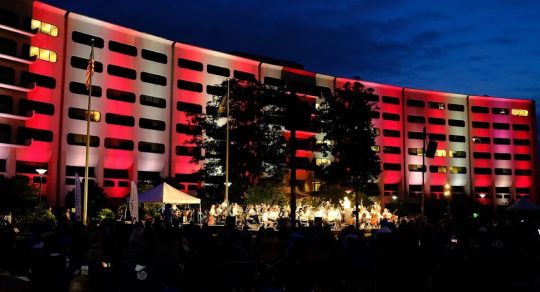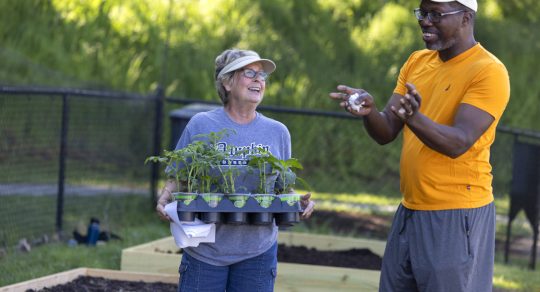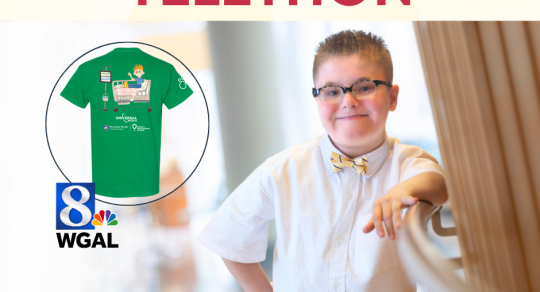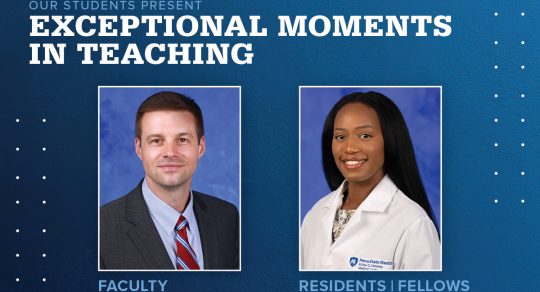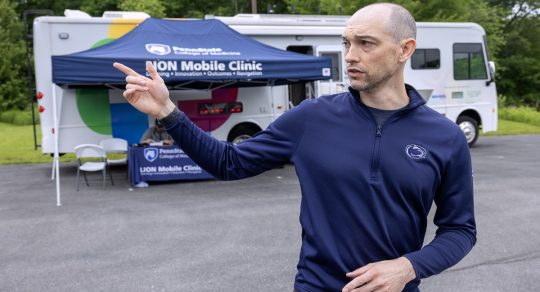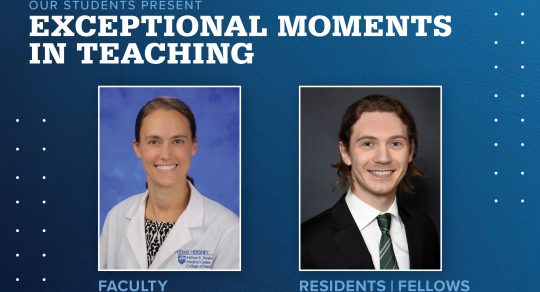Residency
Internal Medicine/Pediatrics
The Internal Medicine/Pediatrics Residency at Penn State College of Medicine is a four-year, ACGME-accredited training program that admits four residents per year.
On This Page
Our Internal Medicine/Pediatrics Residency is a tight-knit group of fantastic residents who are well-trained to become excellent internists and pediatricians, and to move on to their chosen career paths.

Program Overview
Our Internal Medicine/Pediatrics Residency is a tight-knit group of fantastic residents who are well-trained to become excellent internists and pediatricians, and to move on to their chosen career paths. Residents rotate in four-week blocks either on pediatrics or medicine for about four months and then switch. This allows two full winters and two full summers on both medicine and pediatrics. Our residents are assigned a Med/Peds Coach (residency mentor) to help guide them on their career path. There is ample time for learning, as there is a protected academic half-day weekly as well as noon conference four days per week.
Our Internal Medicine/Pediatrics Residency is a tight-knit group of fantastic residents who are well-trained to become excellent internists and pediatricians, and to move on to their chosen career paths.
Residents rotate in four-week blocks either on pediatrics or medicine for about four months and then switch. This allows two full winters and two full summers on both medicine and pediatrics.
We have a very strong relationship with the Internal Medicine Residency and the Pediatrics Residency and have three identities – Medicine resident, Pediatrics resident and Med/Peds resident. This is easy for us as the adult and children’s hospitals are connected to each other.
Our residents are assigned a Med/Peds Coach (residency mentor) to help guide them on their career path. There is ample time for learning, as there is a protected academic half-day weekly as well as noon conference four days per week. Our residents become excellent educators. They have opportunities to present at the weekly Med/Peds Noon Conference. There also are extra opportunities for education and health system science training. This is on top of their individualized electives.
We invite you to explore our website for a more in-depth look at our program.
Supporting Your Training
Learn More about the Residency
Welcome to the combined Medicine/Pediatrics Residency training program! Penn State’s Med/Peds Residency offers diverse training in both adult and pediatric medicine.
Knowing that some residents will pursue diverse career paths, the goal of the curriculum is to provide training that is rich in opportunity and experience. Our university, community and VA hospital rotations complement our combined Med/Peds continuity clinic in inner city Harrisburg.
You will spend the majority of your time at Penn State Health Milton S. Hershey Medical Center. You’ll attend continuity clinic at the Rose Garden Building in downtown Harrisburg, where we care for the underserved as well as adults and children with complex medical problems. To provide a broader experience in community hospital settings, you will also have duties at:
Lebanon VA Medical Center in Lebanon
Penn Medicine Lancaster General Hospital in Lancaster (adult community inpatient experience)
Penn State Lancaster Outpatient Center
You will have the opportunity to seek out and participate in an away elective, nationally or internationally, in an area of interest.
Joint electives in a medicine and pediatrics subspecialty are also possible. Rotations in allergy, dermatology, endocrinology and rheumatology are common. For those residents going into fellowship, we offer an intermittent second continuity clinic in that specialty to gain further experience in that area and to build relationships with their faculty.
Our residents are the key to our success. Our diverse group of trainees come from far and wide and are dedicated, enthusiastic and hard-working. They excel in patient care, leadership and education.
We seek candidates with strong academic records, exceptional interpersonal skills and a sincere desire to work with and for adults and children.
I encourage you to explore more about our program and contact me at rwilliams@pennstatehealth.psu.edu if you have any questions about our program or the interview process.
Ronald J. Williams, MD
Program Director
The mission of this program is to provide innovative and diverse individualized education in a caring culture to achieve excellence in patient care and become leaders in Internal Medicine and Pediatrics who are prepared to pursue their chosen career path.
Aims
The program aims to foster a supportive and personalized learning environment in which each resident:
Graduates from the program as a well-balanced and well-trained internist and pediatrician prepared for the next step in his or her chosen career path
Can pursue all career interests with individualized faculty and peer support
Is provided the opportunity to excel in a transition of care curriculum
Has the opportunity to develop skills to excel in medical education and quality improvement
Fosters excellent relationships with the pediatric and medicine residencies while still maintaining his or her own Med-Peds identity
Feels a sense of ownership in shaping and improving the residency program
General Application Information
All applicants must apply through the Electronic Residency Application Service (ERAS) by Dec. 1 and must register for a PL-1 position through the National Resident Matching Program (NRMP).
Applications are considered without regard to race, religion, gender, sexual orientation or national origin. Only J-1 visas are sponsored.
Applicants who are offered interviews, match into the Med-Peds residency program, and successfully complete the residency, will be able to apply for admission to the certification process of both the American Board of Pediatrics and the American Board of Internal Medicine. Please refer to the American Board of Pediatrics and the American Board of Internal Medicine websites for additional information.
Application Requirements
Personal statement
MSPE (dean’s letter)
Medical school transcript
USMLE or COMLEX scores
Three to four letters of recommendation from faculty members with whom the applicant has worked
The program does not require a letter from the applicant’s department chair.
Interview Process
Interviews are by invitation only, and will be conducted from late-October through January. Those who are invited for an interview will be notified by email and are asked to respond within 72 business hours so the program can best accommodate scheduling needs.
PGY-1
Cassidy Correia
Hometown: Fairhaven, MA
Undergrad: Quinnipiac University
Med School: University of New England COM
Hobbies: Sourdough baking, road biking, skiing
Fun Fact: I grew up racing small sailboats.
Nina Gennusa
Hometown: Wind Gap, PA
Undergrad: Michigan State University
Med School: Geisinger Commonwealth
Hobbies: Currently listening through the list of 1001 albums to hear before you die, peloton classes, collecting post cars, reading, podcasts, testing chocolate chip cookie recipes.
Fun Fact: While I was at MSU in 2015, I got to sit on the floor of the Izzone for the Final 4 game between MSU and Duke in Indianapolis.
Anthony Knepp
Hometown: Zionsville, IN
Undergrad: Ball State University
Med School: Rowan SOM
Hobbies: Playing viola, walking my dogs Olga and Kona, playing with my cat Habichuela
Fun Fact: I used to help raise guide dogs.
Kira Zack
Hometown: Dupont, PA
Undergrad: University of Pittsburgh
Med School: Drexel University
Hobbies: Art, archery, baking, reading
Fun Fact: I've done archery competitively since high school.
PGY-2
Sumiyah Enayet
Hometown: Cary, NC
Undergrad: University of North Carolina, Chapel Hill
Med School: Campbell University SOM
Hobbies: Playing video and board games, drawing embroidery, running, learning songs on guitar or ukulele
Fun Fact: I have twin cates named Zuko and Katara.
Mindy Gruzin
Hometown: Baltimore, MD
Undergrad: Penn State York
Med School: Geisinger Commonwealth
Hobbies: Drawing, painting, crafts
Fun Fact: After graduation in May, my family and I are going to Lithuania to re-trace my grandpa's roots before WW2 and German occupation.
Kristen Miller
Hometown: Wallingford, PA
Undergrad: University of Pennsylvania
Med School: University of New England COM
Hobbies: Hiking, paddle boarding, dog training, cooking, crossword puzzles
Fun Fact: I studied neuroscience and played Division I soccer at UPenn!
Yasaman Vahdat
Hometown: Ashburn, VA
Undergrad: University of Virginia
Med School: University of Virginia
Hobbies: Jogging, reading, hanging out with friends, water activities and sports
Fun Fact: During the pandemic, jet skiing became a fun hobby of mine!
PGY-3
Jacob Colello
Hometown: Camp Hill, PA
Undergrad: Liberty University
Med School: Penn State
Hobbies: Spending time with family, fishing, hunting, playing Zelda, coaching wrestling, learning about nutrition, NFL football
Fun Fact: I have 4 siblings
Matthew Darok
Hometown: Annville, PA
Undergrad: Messiah College
Med School: Penn State
Hobbies: "Reading" audiobooks, playing board games, coaching middle and high school wrestling, serving on my church's worship team, spending time with friends and family
Fun Fact: I recently started jiujitsu classes with my wife and love it!
Sarah Janczewski
Hometown: North Huntingdon, PA
Undergrad: Washington & Jefferson College
Med School: West Virginia University
Hobbies: Reading, watching movies, traveling, board games
Fun Fact: I traveled to the Middle East this year
Nadia Obaed
Hometown: Jacksonville, FL
Undergrad: University of North Florida
Med School: Nova Southeastern University
Hobbies: Kayaking, paddle boarding, creating art, soccer, billiards, listening to wildlife/conservation/wellness podcasts!
Fun Fact: I saw snow for the first time this year, and this will be the first time I am living outside of Florida
PGY-4
Kurestin Miller
Hometown: Rock Hill, SC
Undergrad: Furman University
Med School: University of South Carolina School of Medicine Greenville
Hobbies: Playing piano, watching Broadway shows, dancing, going to OrangeTheory, baking and cooking
Fun Fact: I was a music major in undergrad
Vineet Mohanty
Hometown: Chicago, IL
Undergrad: Vanderbilt University
Med School: NY Institute of Technology
Hobbies: Running, weightlifting, playing/watching soccer and football, reading articles/books on world history
Fun Fact: While saltwater fishing I’ve caught (and released) an adult bull shark
Andrew Nevin
Hometown: Shrewsbury, MA
Undergrad: Wellesley College
Med School: University of Massachusetts
Hobbies: Painting, sewing, baking
Fun Fact: I’ve driven on every single continent (except Antarctica)
Filia Van Dessel
Hometown: Baltimore, MD
Undergrad: Messiah University
Med School: Penn State University
Hobbies: Hanging out at the beach, hiking, biking, backpacking, kayaking, fishing, reading, gaming
Fun Fact: I used to do research on hummingbirds
There are many factors that contribute to a person's happiness, and the active pursuit of balance leading to happiness has become the buzzword everyone loves - "wellness." Wellness attempts to guide individuals to ultimately live each day as the best versions of themselves. There are eight primary elements to wellness, and the Internal Medicine/Pediatrics Residency provides extraordinary support to each of its residents for every component. What is great about wellness, and also what makes it challenging, is every person has unique wellness needs. Each resident in the program is provided with:
formal education on identifying gaps or deficits in overall well-being to allow for self-stewardship of wellness;
resources to support building and repairing any identified or potential deficits;
group practicums for commonly encountered challenges with wellness; and
support from a wellness evaluation and improvement committee, comprising both residents and attending physicians, which meets to develop a multidisciplinary wellness curriculum.
opt-out mental health sessions coordinated with the Office of Professional Mental Health to offer confidential check-in sessions with the option to continue services, if desired. The residency program identifies optimal meeting times to ensure residents are able to attend.
Environmental wellness
Occupying a pleasant, stimulating, supportive environment that supports well-being
Penn State Health Milton S. Hershey Medical Center and Penn State Health Children's Hospital connected, allowing for stable commute times, frequent visits to friends "on the other side," access to a variety of food options
Shuttle service
Well-lit, safe walking paths through campus and throughout the region of Hershey, Harrisburg and Lancaster
24/7 access to the "Zen Den," a meditation room and garden
Multiple outdoor seating venues, able to be used as desired for didactics and "sunshine rounds"
Opportunities for indoor and outdoor activities, including a program-provided wellness activities document with sections for:
Mental health
Fitness
Arts and music
Zoos, aquariums and theme parks
Cooking and baking
Books and audiobooks
Emotional wellness
Understanding and respecting feelings, values and attitudes and the impact every experience has on these attributes
Debriefing sessions after significant events
Formal education in trauma psychology and recognition of burnout in self and others during didactics
Schwartz Rounds, a forum for health care professionals from various disciplines to discuss and examine the emotional and social challenges that arise in caring for patients
An engaging, dedicated Office for Professional Mental Health that offers direct clinical care to resident trainees
Vocational wellness
Participating in work that provides personal satisfaction and life enrichment that is consistent with values, goals and lifestyle
Individualized curriculum with customizable electives
Medicine/Pediatrics noon conferences
Professional coaches assigned during intern year to guide professional development
Formal goal-setting curriculum to identify areas for professional growth and improvement
Multitude of formal education programs to aid in career development for research, medical education, humanitarianism, global health, public health, health systems science and quality improvement
Regular resident roundtables, house staff lunches and program business meetings to address program improvement initiatives
PAWS UP program to recognize and celebrate the incredible work force at Penn State Health
Physical wellness
Caring for and nurturing the body for optimal health and function
On-campus fitness center
Bike share program
Fitness Your Way pass providing access to more than 10,000 gyms nationwide
30-day activity challenges
Susquehanna Area Mountain Bike Association (SAMBA) bike trails, with three close by campus
Appalachian Trail access
Discounted meal plans for both national and local meal prep
Multiple year-round farmers' markets with local, affordable organic produce
Employee Health Care Concierge
Financial wellness
Managing resources to live within means and developing skills to make informed financial decisions and investments
Regular meetings with financial adviser
Low cost of living
Personal finance lectures
Student loan management advice
Stipend for medical education and reimbursement for conference travel
Spiritual wellness
Finding purpose, value and meaning in life with or without organized religion
Opportunities for spiritual education with hospital chaplains
On-site multi-faith worship area
Weekly religious services held on site
Biweekly guided meditation sessions
Intellectual wellness
Developing and maintaining curiosity about all learning opportunities and responding positively to intellectual challenges
Research coaches and mentors with a formal research curriculum and track for those interested
Literature search services through Harrell Health Sciences Library
Physician Writers' Group workshops
Dedicated Learning and Leadership Development team
Social wellness
Establishing skills to encourage communication, trust and conflict management while engaging and supporting one other
Quarterly class wellness nights with coverage of clinical duties
Program-coordinated residency wellness events and retreats
"Big/Little" program
Pediatric administrative and wellness sessions (PAWS) twice monthly
Volunteer opportunities to help underserved patients at Bethesda Mission
Volunteer opportunities with THON (Penn State IFC/Panhellenic Dance Marathon) for childhood cancer
Volunteer opportunities at Camp Kydnie, Camp Spifida, Camp STAR, PA Vent Camp and Camp Lionheart for children with chronic illness
Department of Pediatrics Diversity, Equity and Inclusion Council
The Department of Pediatrics Diversity, Equity and Inclusion (DEI) council is led by the vice chair of DEI, Ashutosh Kumar, MD, and is composed of physicians (including residents) and nurses from across the Department of Pediatrics. The council’s mission is to continually improve the inclusivity and equity with which the Penn State College of Medicine Department of Pediatrics provides healthcare, medical training, and advances medical science by:
Providing pediatric patients and their families with excellent, compassionate, culturally responsive and equitable care.
Supporting the department in recruiting, hiring and retaining a group of diverse faculty, trainees and staff, while equipping Department members to provide culturally responsive and equitable care.
Ensuring that scholarly pursuits account for, evaluate and address potential social determinants of health beyond race and ethnicity, and that our research reflects a diverse and representative population.
Striving to ensure our educational experiences foster and value equity, inclusivity, cultural competency and the needs of a diverse population.
Anti-Bias Policy
Penn State Health and Penn State College of Medicine celebrate, embrace and support the diversity of all patients, faculty, staff, students and trainees. Beginning in May 2017, Penn State Health’s Patient's Rights and Responsibility Policy was updated to include a section stating that patients cannot decline the care of a provider based on the provider’s race, religion, gender, age or sexual orientation. Penn State Health became one of the first health care systems nationwide to establish an official anti-bias policy that protects providers when such cases arise.
Resident Spotlight
"A highlight for me as a resident physician is the opportunity to work directly with Penn State College of Medicine's local Student National Medical Association (SNMA) chapter. (SNMA is) an organization that was founded in 1964 at my alma mater, Howard University College of Medicine, as a subdivision of the National Medical Association (NMA), to support current and future underrepresented medical students, addressing the needs of underserved communities, and increasing the number of clinically excellent, culturally competent and socially conscious physicians."
- Monica Adedeji, MD Resident
Resident Perks
Annual book money allowance
Residency pays for copies of Harriet Lane and Bright Futures Pocket Guide
Departmental travel grants up to $2,000 for presenting research at conferences (including free poster production)
“Meal Allowance” to be used at hospital cafeterias or Starbucks
Program additionally provides lunch twice per week
Stocked resident fridge (free meals, snacks and drinks at night)
Free American Academy of Pediatrics (AAP) membership providing monthly print journals (Pediatrics and Pediatrics in Review) as well as Board Review Questions (PREP)
Free American College of Physicians (ACP) membership
Free board preparation question banks and teaching materials
Free certifications and updates of BLS, PALS, NRP and ATLS
Free on-site parking
Retreats and wellness events paid for by residency
Leadership



(she/her/hers)
Program Coordinator, Pediatric Residency and Internal Medicine/Pediatrics Residency, Pediatrics
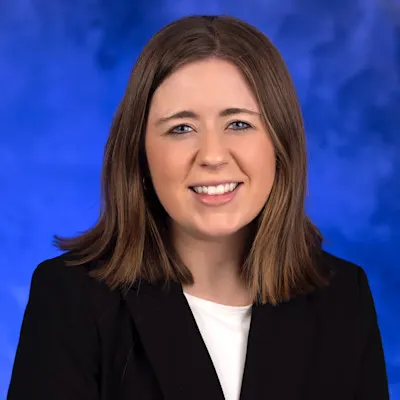
(she/her)
Graduate Medical Education Coordinator, Pediatric Residency and Internal Medicine/Pediatrics, Pediatrics
Curriculum Details
Highlights
Penn State Health Milton S. Hershey Medical Center is a large, academic tertiary and quaternary referral center, with Penn State Health Children's Hospital right next door (attached)
Offers experience in the highest-level NICU, PICU and medical ICU, in one place
Balanced Medicine/Pediatrics residency program
Global Health opportunities including institution-wide affiliation with Ghana
Residents as educators curriculum
Medical education elective
Woodward Center sessions and teaching champion retreats
Medicine/Pediatrics resident-created simulation sessions to practice rapid responses/code situations offered monthly
Combined Medicine/Pediatrics continuity clinic
Health System Science, QI and Transition education
Overview
Since its inception in 1988, the Internal Medicine/Pediatrics Residency has trained well-balanced medicine/pediatrics physicians who excel in patient care, leadership and education. The success of the program begins with the dedicated residents who are integral in the formulation of the diverse experiences that are offered. Due to the varied experiences, residents can explore their interests during training and are well-equipped to pursue any medical specialty career path they wish.
The program allows residents to participate in a variety of rotations to help shape their future medical careers. Interns rotate for 16 months – eight months in medicine and eight months in pediatrics. This rotation helps build a strong foundation of knowledge and confidence prior to starting the senior resident-level rotations. Residents rotate every two to four weeks, alternating between medicine and pediatrics approximately every four months.
Additional rotations are available to help residents tailor their education to fit with their interests, including, but not limited to, the following:
Caring for the underserved population (various locations)
Milton Hershey School (cost-free private residential school for children from low-income families)
Emergency medicine; residents participate as first responders with Penn State Life Lion critical care and emergency medicine services.
Global health
Hospitalist (for both adult and pediatric care)
Education elective
Create your own!
Standing Med/Peds Weekly Conferences – Tuesdays at noon
Each week, a member of the Med/Peds resident team presents a topic typically related to care in the outpatient setting. These conferences are an hour long and allow residents to polish their presentation skills and provide useful medical updates and clinical information. The Med/Peds faculty team members frequently attend and offer valuable information on how the topic relates to their respective specialty. Additionally, residents commit to an “academic half-day” on Thursdays, to dedicate a block of time to focus on core internal medicine and pediatric topics.
Med/Peds Continuity Clinic
The continuity clinic, located in downtown Harrisburg, allows residents the opportunity to work closely with an underserved patient population. The clinic serves adults and children with varying medical and health-related needs, from “bread and butter” to complex chronic medical conditions, gender identity, HIV, social concerns and substance abuse. Residents work exclusively with Med/Peds faculty to see a variety of patients for both annual physical exam and acute visits. They serve as the primary care providers for these patients.
The continuity clinic is part of the Reach Out and Read Program that provides books for infants and children during well-child visits, as a way to encourage literacy. The clinic also provides access to a Penn State Health social worker to help patients with a wide array of social concerns that may impact their care and well-being. A substance abuse clinic is also available on-site to help reduce barriers to medical care for those with addictions.
Quality Improvement Projects
Quality improvement (QI) is an important aspect of the Medicine/Pediatrics residency, with residents often involved in medicine and pediatrics QI projects and as resident representatives on unit-based quality committees. A detailed QI curriculum provides resources, education and experiences to help each resident create their own project prior to graduation or participate in our Med/Peds QI projects in the clinic. There are also opportunities for more education in this area with Penn State College of Medicine’s Health Systems Science Academy.
Transitional Care Curriculum
The Medicine/Pediatrics residents have created a transitional care program to educate adolescents and their parents on the process of transitioning medical care from pediatricians and pediatric specialty providers to adult providers and specialists. Residents help integrate the transitional care concepts into the pediatric specialty clinics and the well-child checkups in the pediatric clinics. The program has incorporated these concepts into the pediatric and internal medicine residency academic half-day curriculum to help teach these concepts to the categorical residents.
Supportive Learning Environment with Professional Coaching
There are 23 Medicine/Pediatrics Residency faculty members, all of whom have been trained in both medicine and pediatrics, and are actively involved in various aspects of the residency. Each member of the faculty is approachable and willing to provide advice and guidance to the residents. In addition, each resident is assigned a physician coach for professional development advice and encouragement throughout the four years of residency. The program also encourages you to find several mentors to help you reach your career goals.
Educational Resources
To support individual learning, residents are provided with memberships in the American College of Physicians (ACP), American Academy of Pediatrics (AAP) and the National Med-Peds Residents’ Association (NMPRA), as well as $600 for books and educational expenses per year.
The AAP membership also provides access to Pedialink online learning center, Pediatrics and Peds in Review. The ACP membership includes a subscription to the Annals of Internal Medicine. In addition, subscriptions to the Yale Pediatric and Internal Medicine Outpatient Curriculum are provided.
Ongoing board review occurs throughout the four years of residency, with residents attending a board review course at the end of training.
Residents as Educators
The Woodward Center for Excellence in Health Sciences Education is designed to cultivate excellence in health sciences education. Longitudinal didactics on multiple aspects of teaching, evaluation and feedback and goal-setting are offered. The Woodward Center provides programs such as Stanford Clinical Teaching Skills workshops and the Woodward Scholars program.
There are extra opportunities for education such as the Medical Education quarterly retreats, the Medical Education two-week elective, the Medical Education Track and many others. The program also offers a Health Systems Scholar position each year. You also have the opportunity to become an Area Health Education Center (AHEC) Scholar.
(Starting on internal medicine)
Adult cardiology inpatient – four weeks
Adult hematology/oncology inpatient – four weeks
Vacation – two weeks
Medicine elective – two weeks
General medicine inpatient (Penn State Health Milton S. Hershey Medical Center) – four weeks
General medicine inpatient (Lebanon VA Hospital) – four weeks
Pediatric acute care clinic – four weeks
General pediatric inpatient – four weeks
Pulmonary pediatric inpatient – two weeks
Pediatric gastroenterology/cardiology/nephrology inpatient – two weeks
Pediatric night float – two weeks
Vacation - two weeks
Newborn nursery – two weeks
Pediatric elective – two weeks
Medicine night float – two weeks
Medicine elective – two weeks
Medical intensive care unit – four weeks
Adult emergency medicine – four weeks
Pediatric elective – two weeks
Vacation – two weeks
Development – four weeks
Underserved rotation – four weeks
Neonatal intensive care unit – four weeks
Adult ambulatory – four weeks
Adult nephrology – four weeks
General medicine inpatient senior – four weeks
Medicine elective – two weeks
Vacation – two weeks
Medicine elective – four weeks
Pediatric critical care unit – four weeks
Adolescent – four weeks
Pediatric emergency medicine – two weeks
Neonatal intensive care unit – four weeks
Medicine elective – four weeks
Vacation – two weeks
Hepatology – two weeks
Medicine elective – four weeks
General medicine inpatient senior (Penn State Health Milton S. Hershey Medical Center or Lebanon VA Hospital) – four weeks
Pediatric elective – four weeks
Pediatric hematology/oncology inpatient – four weeks
Vacation – two weeks
Pediatric night float senior – two weeks
Pediatric emergency department consult – two weeks
Pediatric elective – two weeks
Pediatric emergency medicine – four weeks
Geriatrics – four weeks
Adult cardiology inpatient senior – four weeks
Medicine elective – four weeks
Medical intensive care unit senior – four weeks
Pediatric pulmonary inpatient senior – two weeks
Pediatric gastroenterology/cardiology/nephrology inpatient senior – two weeks
Newborn nursery senior – two weeks
General pediatric inpatient senior – four weeks
Pediatric elective (individualized curriculum) – four weeks
Vacation – two weeks
Medicine elective (individualized curriculum) – four weeks
General medicine inpatient senior (Lebanon VA Hospital) – four weeks
General medicine inpatient consult senior – two weeks
Vacation – two weeks
Medicine night house officer (senior) – two weeks
Medicine elective – two weeks
Medicine elective – four weeks
Pediatric elective – four weeks
Pediatric acute care clinic senior – four weeks
Pediatric emergency medicine – two weeks
Pediatric elective – four weeks
Pediatric elective – two weeks
The multifaceted Clinical Simulation Center is a 9,500-square-foot space including some small encounter rooms, three larger bays, skills training areas and rooms for debriefing purposes. Many educational opportunities are provided here, including a simulation instructor course (resulting in a certificate in simulation education), the Resuscitation Sciences Training Center and a standardized patient program. Along with full-bodied manikins of all ages, there are many types of clinical equipment in order to practice clinical diagnosis and treatment, as well as simulation scenarios such as procedures, surgery and trauma. The Clinical Simulation Center is staffed for a majority of the day each weekday. The Pediatric Residency incorporates simulation lab didactics during one academic half-day each quarter. Learn more about the Simulation Center
Pediatrics SIM Curriculum
Situ simulation sessions are focused on improving resident self-efficacy in assessment and stabilization of critically ill children. Sessions are run by chief residents solely for pediatric residents to provide protected educational space for targeted teaching of knowledge and skills.
Residents interested in global health have multiple opportunities at Penn State Health and Penn State College of Medicine, including international travel electives and virtual self-directed rotations.
The most popular affiliation/elective is to Ghana.
When: January or February
Duration: Four weeks
About the facility: The program takes place with Penn State Health Children’s Hospital’s clinical partner, Eastern Regional Hospital, a 429-bed hospital that serves as the primary care center for the local community and is the referral hospital for 16 district hospitals in the region. It includes a six-bed intensive care unit, lab, CT scan and X-ray. Many specialties are housed here.
Rotation details: Experiences in NICU, pediatrics floors and pediatric outpatient clinics. The department funds a significant portion of the trip for multiple residents each year, and upon their return, participant experiences are shared during a Grand Rounds presentation.
Pediatric residents join staff at the Community Base Health Planning & Services in Ghana.
Pediatric residents exploring the Kakum National Forest.
The Med/Peds residency program is partnering with Penn State Health’s Global Health Center hosting a series of global health lectures taking place during the weekly noon conference. Lecture topics include:
GH Scholars Program Overview and GH Scholars’ Perspectives on HIV Around the Globe
Adaptations to Care and Evidence Based Care in LMIC Settings
Poverty and Health
Pediatrics and Ped Surgery in Rural Malawi
Vulnerable Populations and HealthCare Systems Around the Globe
Healthcare in War Times: War Related Injuries
Global Mental Health
Vulnerable Populations: The Rural Health Crisis
Resident Honors and Recognitions
Penn State College of Medicine and Penn State Health Milton S. Hershey Medical Center accept ongoing nominations for the Exceptional Moments in Teaching award. The award, given monthly by the Office for a Respectful Learning Environment, accepts nominations from College of Medicine students who are invited to submit narratives about faculty members, residents, fellows, nurses or any other educators who challenge them and provide an exceptional learning experience. See more about the award here.
Recent Nominees
December 2024: Kelsey Yamada, MD, PhD
Nominator Statement From the first day on my Medicine A rotation, Dr. Yamada immediately integrated me into the team and allowed me to be involved in all aspects of patient care. He took time each day to teach the team and constantly encouraged me to create assessments and plans on my own, which only strengthened my clinical knowledge as a student and learner. Each day, Dr. Yamada fostered an environment of curiosity, encouraging questions, promoting critical thinking, and ensuring that every learner feels heard and supported. He allowed me to care for multiple patients and pushed me to think about my plan for every aspect of their care. He was an incredible role model for the kind of physician I strive to become one day, as I hope to be as patient, knowledgeable, and understanding as he is. I am incredibly thankful to have had the opportunity to work with Dr. Yamada, and am looking forward to building upon the foundation of clinical knowledge he has given me. I began this rotation unsure of my residency speciality; however, Dr. Yamada has helped me understand how fulfilling and exciting a career in IM is and he is one of the main reasons I will ultimately be leaving this rotation with Internal Medicine as my top choice.
November 2024: Shane Stone, DO
Nominator Statement Dr. Stone was a phenomenal mentor and teacher during my Internal Medicine rotation at the VA. He consistently took any opportunity to teach me topics relevant to our patients and offered validating and supportive feedback, which made it a very positive learning experience. It was apparent that he genuinely cared for his patients and demonstrated thorough patient care. He also led the team in a composed and confident way, delegating tasks to ensure we worked efficiently. Overall, Dr. Stone was one of the best physicians I have worked with in my nine months of rotations, and he served as a great example for the type of physician I aspire to be. Thank you Dr. Stone for a great experience!
January 2023: Kurestin Miller, MD
Nominator Statement Kurestin went above and beyond to make my pediatric rotation meaningful and educational. She consistently took the time to teach me about topics relevant to patients on our list and more importantly taught me about why she was doing specific parts of the physical exam and debrief after on why she was asking important questions of the history.
December 2022: Robert Mullin, DO
Nominator Statement I had the privilege of working with Dr. Mullin during my 4 week internal medicine rotation. Dr. Mullin deserves recognition for the way he leads his medicine team, engages students, and cares for patients. Dr. Mullin was always quick to step in an help team members, no matter what the task. Despite being busy running the team as chief resident, he also took the time to teach students boards-relevant topics and helped us get involved in the service and take ownership of our patients' care. Lastly, I will never forget when Dr. Mullin took hours out of his day to advocate on behalf of a patient who was presenting with symptoms concerning for a severe condition that was not being included in the primary team's differential. Dr. Mullin took it upon himself to pursue the matter and obtain further imaging and workup, ultimately leading to a diagnosis concerning for cancer. His effort, going above and beyond the call of an already demanding duty, prevented a patient from being discharged before they received this crucial diagnosis and the treatment it required.
August 2022: Robert Mullin, DO
Nominator Statement Bobby is hands down the best resident that I have ever worked with! Bobby was fantastic at leading our team, effortlessly balancing the needs of the interns, providing excellent care to all patients, maintaining a professional and working relationship with the attendings, and creating an effective learning environment for medical students. Bobby daily would take the medical students aside to teach and tailored the learning to what we requested. For example, I requested to learn about heart murmurs and he printed out a packet on heart murmurs and spent over an hour explaining the concepts and answering my questions about it. He also did this with arterial blood gas and many other difficult topics for medical students to manage. For all of these difficult topics he easily explained the concepts in a palatable way that made sense to all of the medical students. Bobby was also great at using questions to further my understanding. Daily he would ask me questions, often described as "pimping" though he did it in a way that was supportive and allowed me to further learn. If I did not know the answer to the question he would ask another question to try and help me get to the right answer and I always felt supported. He never once made me feel dumb or stupid for not knowing the answer to his questions. I always was able to ask him questions and knew that he would provide me with an easy to understand answer. Bobby was also great at leading. I was daily impressed by his ability to manage residents, excellent patient care, attendings, care coordination rounds, and medical students. He never once pushed the medical students aside and always brought us into the team. He stood up for medical students learning and made sure that we had patients in which we could effectively learn. Bobby also would assign me and the rest of the medical students topics to teach each other each day. This was super helpful in my learning as it allowed me to understand a concept well, teach it, and hear about what the other medical students were teaching on. During these mini learning session he would further ask questions to help solidify concepts and continually draw connections to STEP questions or patients that we were seeing. I also really appreciated how during rounds he would ask questions to further our understanding of the various disease processes that the patients we were caring for had. He would made connections to STEP questions, previous topics we had talked about, or other resource material that we were familiar with. I learned SO much with Bobby as my senior! He was a fantastic educator and constantly maintained a professional, safe, and effective learning environment for me and the rest of the medical students. Penn State would be lucky to have Bobby as an attending in the future and any student that gets to work with him is truly lucky!
August 2022: Robert Mullin, DO
Nominator Statement Dr. Mullin is an excellent teacher and model physician. I never learned so much on a rotation as I did while working with him. Excellent example of good patient care as well as team leadership -- always available to help others and the team. He would assign daily topics for our student team to discuss in the afternoons -- he always made student learning a priority. He demonstrated quality patient care, and I was able to witness him in several Goals of Care conversations, where I was blown away by his patience and his ability to speak and reason with families. I believe that if anyone deserves a nomination for Excellent Teaching, it's him.
July 2022: Robert Mullin, DO
Nominator Statement Dr. Mullin was the senior resident on my team during my internal medicine inpatient rotation. He was extremely passionate and enthusiastic about teaching, even with a busy clinical schedule. I appreciated that each afternoon, he took time out of his day to provide a mini lesson on a topic that we wanted to learn more about. He also went out of his way to create learning resources and handouts for us. For example, he created several handouts on EKG interpretation and walked us through EKG interpretation. Overall, he made the rotation incredibly educational and enjoyable!
July 2022: Shane Stone, DO
Nominator Statement Dr. Stone treated me with complete respect and fully incorporated me as part of the care team during my week with Acute Outpatient Pediatrics. He challenged me to see patients on my own and come up with differential diagnoses and plans, and he spent much time teaching me. His warm, supportive demeanor made me feel comfortable interacting with the team in a new clinical setting.
The annual Resident/Fellow Research Day is held each year (with exception of during the COVID-19 pandemic) on and around the Penn State Health Milton S. Hershey Medical Center campus. The intent of the event is to provide an opportunity for residents and fellows to showcase their research accomplishments to their peers in other clinical departments, as well as their colleagues in the basic sciences. .
Contact Information
Mailing Address
Medicine/Pediatrics Residency
Penn State Health Children’s Hospital
600 University Dr.
Mailcode H085
Hershey, PA 17033
General Contact Information
Phone: 717-531-5685
